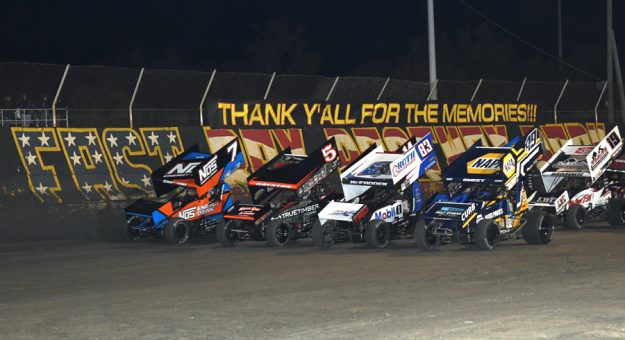NOBLESVILLE, Ind. — Tony LaPorta spent the past two years on the outside — waiting, hoping and praying. Would he get another chance to pursue his dream, the thing he’s wanted more than anything in the world?
The answer was yes.
LaPorta has a new gig as pit reporter for the High Limit Racing sprint car series, joining Chase Raudman who is in the booth for both the PA call and the streaming of High Limit events. LaPorta’s hiring was among several offseason moves that produced significant changes as to the faces and voices on sprint car broadcasts.
LaPorta’s story is a familiar one in these modern times.
He was hired as the voice of USAC sprint cars and midgets in 2021, a kid in his late-20s with microphone experience in road racing but little open-wheel experience. Like a wobbly fawn trying to get his footing, there were times when his inexperience was apparent.
The racing audience showed no mercy. After each broadcast they flocked to social media and message boards to deride and howl, and by the end of the season got their collective wish when USAC sent LaPorta packing.
Wounded and hurting, LaPorta joined World Racing Group and spent the past two seasons behind the camera, creating content for the World of Outlaws. Through it all, he never gave up hope that he would get another shot at holding a microphone.
“That was a hard episode,” LaPorta said of 2021, managing a smile. “I’ve tried to learn from all that and tried to take some things from it that would make me better as an announcer. Most of all I just tried to stay positive and keep the faith that I’d get another chance to do this.”
Racing — and maybe the entire modern world — has reached a strange new threshold.
We’ve become so self-absorbed that we feel empowered to demand things be exactly as we wish them to be. It isn’t enough to simply enjoy something; it must be presented and executed precisely as we see fit, and if isn’t we are entitled to share our discontent as loudly as possible.
And brother, there is a lot of discontent out there. Promoters and officials often bear the brunt of it, but also announcers. The trouble is, these folks are — believe it or not — human. And nothing crushes the psyche quite like being told you’re a worthless idiot as you’re trying to pursue your dreams.
“It was a humbling experience, I’m not going to lie,” LaPorta acknowledged. “I’d spend the time during the (USAC) broadcasts loving everything I was doing, then when it was over, I’d look at social media and it felt like my life was a wreck. I’m not sure anything prepares you for that and it’s hard to process it while it’s happening.
“The hardest part is sifting through the criticism to find the things you need to improve on. I was in a learning mode and I know I made mistakes. I wanted to get better but it’s hard to stay positive when it feels like everybody wants to burn you down.”
There is the old axiom that what doesn’t kill you, makes you stronger. That’s the approach LaPorta has embraced.
“No doubt, I’m better prepared this time around,” he insisted. “I’ve spent the past two years carrying a camera around every pit area the Outlaws visited, building relationships, learning, trying to gain knowledge. But I’m also better prepared to navigate things and keep things in perspective.
“The best thing that’s come of the past two years is that it’s helped me understand that announcing is my true passion. I enjoyed running a camera and creating content, but my calling is working behind the microphone. And I’ve also learned that you can’t let other people stop you from pursuing your dream, and living the life you want.”
Like anyone who has endured a setback, LaPorta had lots of time to over-think and over-analyze the disappointments of 2021.
“At first I was mad at USAC and mad at the people who complained, and then finally I was mad at myself,” he said. “It’s hard to make sense of it when you’ve had a disappointment like that, when things didn’t go like you wanted them to. The worst part was being scared, thinking that I’d never get another chance to work behind the microphone. It’s hard to deal with that kind of fear.
“But time helped me get through it. I wish things had gone differently, sure. But you reach a point where you let it go and move on. I’m not mad at anybody, I’m just glad for the new opportunity.”
The experience of enduring a hail of criticism has shaped LaPorta and tempered his own opinions and the way he expresses them.
“Listen, I’ve got opinions, just like anybody else,” he said. “But when you’ve been on the receiving end of so many negative opinions, it changes your perspective. For me, I try to be a lot more understanding, a lot more patient with the stuff that’s going on around me.
“It’s made me realize how much our words matter. Racing people love our sport, no doubt, but I’m not sure they understand that the people they’re tearing down love the sport just as much as they do, and they’re doing the very best they can. That’s something I try to remind myself of anytime I have an opinion of somebody and what they’re doing.”
Most of all, says LaPorta, his role with High Limit finds him grateful and excited for his new opportunity.
“Luckily, I’ve had a lot of people encouraging me, and when High Limit gave me this opportunity, I saw it with a whole new perspective,” he said. “I’m grateful and I want to enjoy this experience to the utmost.”
